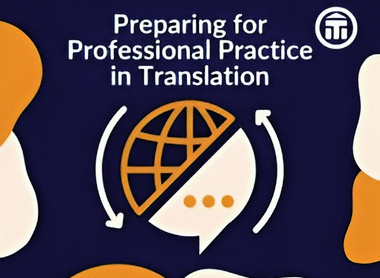7 things I wish I'd known before starting out as a freelance translator
Prepare as you might, when you start out as a freelance translator, it’s tough to cover all the bases. Sarah Bowyer MITI shares some early lessons based on her own experience which will help you get off to a strong start.
1. Network, network, network
Just because you’re at home in your office, it doesn’t mean you can’t build up a big online network. In a recent YouTube interview, I mentioned how I started out by thinking that other translators wouldn’t want to get to know me because they'd see me as a competitor for translation jobs. Thankfully, I was completely wrong about that. Other translators in ITI's subject, language and regional networks can be a great source of support. In fact, most of my work has ended up coming from referrals. So, reach out!
2. You don’t have to have an MA in Translation
Translation is a complex skill and not something you can just do. Proper training and building up experience are both essential. That said, you don’t need an MA in translation to be a successful translator. Specialist knowledge of a particular industry, such as law, medicine or marketing can count for a lot. If I’d realised this earlier, I probably would have made the move into translation much sooner.
If you need to build up your CV, translation accreditation is helpful. One option is to work towards full membership of a professional body, for instance, by working towards becoming a Qualified ITI Member. If you want a post-graduate qualification, there is the DipTrans, which I also opted for. I trained with The Translator’s Studio and have now become a tutor for them. Investing in my learning and getting feedback on my translation skills have been essential: after all, top-notch work is the best way to keep clients coming back.
3. Good equipment makes a difference
You’re probably aware of the importance of setting up your workspace correctly, e.g. having a laptop stand to get your screen up to eye height, investing in a high-quality office chair and using a separate keyboard and mouse rather than those on your laptop. When I started out as a freelance translator, I ignored this to my detriment and soon found I was suffering with neck and back pain and eye strain. After completing a full review of my workspace, I identified several issues, invested in the right equipment and now feel healthier and more productive.
I was lucky enough to have a laptop with a fast processor and decent amount of storage plus super-fast fibre broadband, so I felt I had these areas covered. What I hadn’t considered was what I’d do if my computer broke down or my Internet connection failed. It’s worth thinking about contingencies for those eventualities and maybe investing in a second laptop, backing up your work regularly and having a broadband package that will swap over to 4G when there are connection problems.
Although you may not have the funds to invest in all those things on day one, it’s worth bearing them in mind and getting the best you can afford.
4. Do a training course on your CAT tool
While most translators are intimidated by CAT tools when they first start out, once you actually get one, you’ll find they're fairly easy to use. I did a one-hour webinar and then decided to learn on the job. The problem is that I sometimes need a more advanced feature. I then have to spend an hour Googling to figure out how to use it. This often leads to the realisation that I've been wasting a lot of time using the CAT tool inefficiently.
If I could go back in time, I’d take a day or two to do the courses right up to advanced level and get the certification. In the long run, the investment will pay off through time saved on the job. You’ll also impress your clients with your excellent CAT skills.
5. Specialising doesn’t mean missing out on work
I moved into freelance translation after working for 10 years as a solicitor. At first, I was worried clients wouldn’t want to work with me if I only targeted legal projects. As it turned out, I couldn’t have been more wrong. My legal specialisation meant I was able to attract a number of valuable clients very early on. I was then able to use my love of sport to attract clients specifically looking for legal translators with sports knowledge.
With a clear specialisation, I’d say you're at an advantage over your competitors. If you’ve only studied languages so far, it’s worth considering gaining qualifications in a specialist subject as this will allow you to create a very strong and diverse CV.
6. Use a style guide
I’ve found that many clients don’t give detailed instructions about what they want. They sometimes provide a style sheet or reference documents, but these are normally fairly superficial. When you’re working on the job, you may encounter lots of nagging doubts: should this be capitalised? Do I need italics or inverted commas here? If you choose a style guide to follow, you can make all these decisions for yourself and apply them consistently. This will save you time and ensure quality in your work.
7. Don't undervalue yourself
Everyone says this but it takes a while to assimilate it. When you’re in a rush to get your first clients, it’s easy to accept bad offers. I wish I’d really believed that it’s better to be selective with clients from the word go. This means you’ll hit sustainable earning targets sooner and be happier in the long run.
I hope these 7 tips have given you some new ideas. I wish you every success in your career as a freelance translator.
ITI training

This self-paced course offers practical advice for launching your business. Learn the vital skills and gain the essential knowledge you need to establish yourself as a successful professional translator.
FIND OUT MORE!







